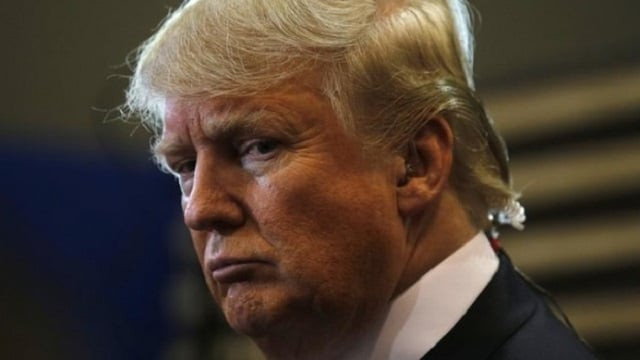Afghan reality check
While Trump's speech is long on rhetoric, it is short on substance

US President Donald Trump. PHOTO: REUTERS
The reality is that Washington’s Afghan quagmire is the result of several American acts of omission and commission dating back to their 2001 intervention in Afghanistan.
From the outset, America has ignored the lessons of history. The tribes in the Pakistan-Afghanistan border region have fought invaders since Alexander, followed by the Mughals, the British and more recently the Soviets. All had to eventually withdraw from there. This is the stark reality confronting America today. Welcome to the graveyard of empires.
This has been compounded by the lack of a clear strategic objective. At first, President Bush only wanted to eliminate al Qaeda but then got into nation-building. Obama ordered a surge to create conditions for troop withdrawal by 2014, leaving behind forces only for logistic support and training. Now Trump is back to eliminating terrorists but not nation-building.
After dislodging the Taliban, the US failed to capitalise on its quick victory by failing to provide the hammer and anvil with Pakistan to prevent the Taliban and al Qaeda forces from relocating and regrouping. It also ignored Pakistan’s advice not to alienate the majority Pashtun by aligning with the Tajik-led Northern Alliance, and refusing to coopt moderate Taliban leaders opposed to al Qaeda. Worse, the unitary constitution imposed on Afghans violated traditional tribal autonomy, creating a Pashtun backlash in the Taliban’s favour. American failure to win Afghan hearts and minds through effective economic and social development programmes also contributed to the appeal of the Taliban, especially among Pashtuns. Worst of all, the indiscriminate use of air power, cruise missiles and drones, led to thousands of casualties. This “collateral damage” brought recruits to the Taliban in droves, and underscores their appeal today.
A tried, tested and failed strategy
The American shift of focus from Afghanistan to the Iraq war further helped the Taliban to re-group and target American/Nato and Afghan forces with increasing effectiveness. Local disenchantment with the corrupt and ineffective Kabul government, fuelled by failed promises and continuing insecurity, also provided the necessary public support for the Taliban. Consequently, the Taliban now effectively control half of Afghanistan, including even non-Pashtun areas in the north and east of the country.
The US has also failed to eliminate the drug trade, a vital source of funding for the insurgents. Even Afghan government ministers and officials are reportedly involved in this narco-terrorist network, an example of the complete breakdown of governance in the country.
This situation has now become even worse with the emergence of Islamic State or Da’ish, a threat recognised by Russia, China and Iran, owing to which they are now opening links with the Taliban, the only force currently opposing the IS in Afghanistan. The US also needs to recognise that the greater long-term threat to its security is posed by the IS rather than the Taliban.
Unless Trump learns from past American mistakes and recognises existing ground realities in Afghanistan, his “strategy” will fail. Washington needs to distinguish between the Taliban and al Qaeda/IS terrorists — the latter can be eliminated, the former cannot, unless half the Afghan population is wiped out. There is also no military solution to the Taliban, as the last 17 years of warfare demonstrate. The only option is a political solution based on power sharing among Afghans arrived at through dialogue.
Instead of threats and punitive action, America needs to work with Pakistan, which is crucial for an Afghan solution. It must recognise Pakistan’s security interests in Afghanistan and South Asia as a whole, which are being undermined by their support to Indian involvement in Afghanistan. Washington must also help to close down Indian-sponsored TTP sanctuaries in Afghanistan while cooperating with Pakistan to effectively seal the Pakistan-Afghan border. Over the longer term, the US should address the real terrorist threat posed by the IS and al Qaeda remnants in collaboration with Pakistan and other regional powers like Russia and China.
World responds to Trump's new Afghan strategy
But, unfortunately, Trump has not given any indication of recognising South Asian realities. He has almost entirely blamed Pakistan for America’s Afghan quagmire and threatened terrible retribution, including giving India and even greater role in Afghanistan. This will neither encourage Islamabad’s cooperation nor intimidate Pakistan to abandon its crucial priority which is to ensure its regional security against Indian machinations. Moreover, any sanctions or violations of Pakistani territory will create a popular backlash that will deny America the vital means to deal with Afghanistan. Therefore, to use Pakistan as a scapegoat is not a strategy, it is an excuse for failure.
Published in The Express Tribune, August 23rd, 2017.
Like Opinion & Editorial on Facebook, follow @ETOpEd on Twitter to receive all updates on all our daily pieces.














COMMENTS
Comments are moderated and generally will be posted if they are on-topic and not abusive.
For more information, please see our Comments FAQ